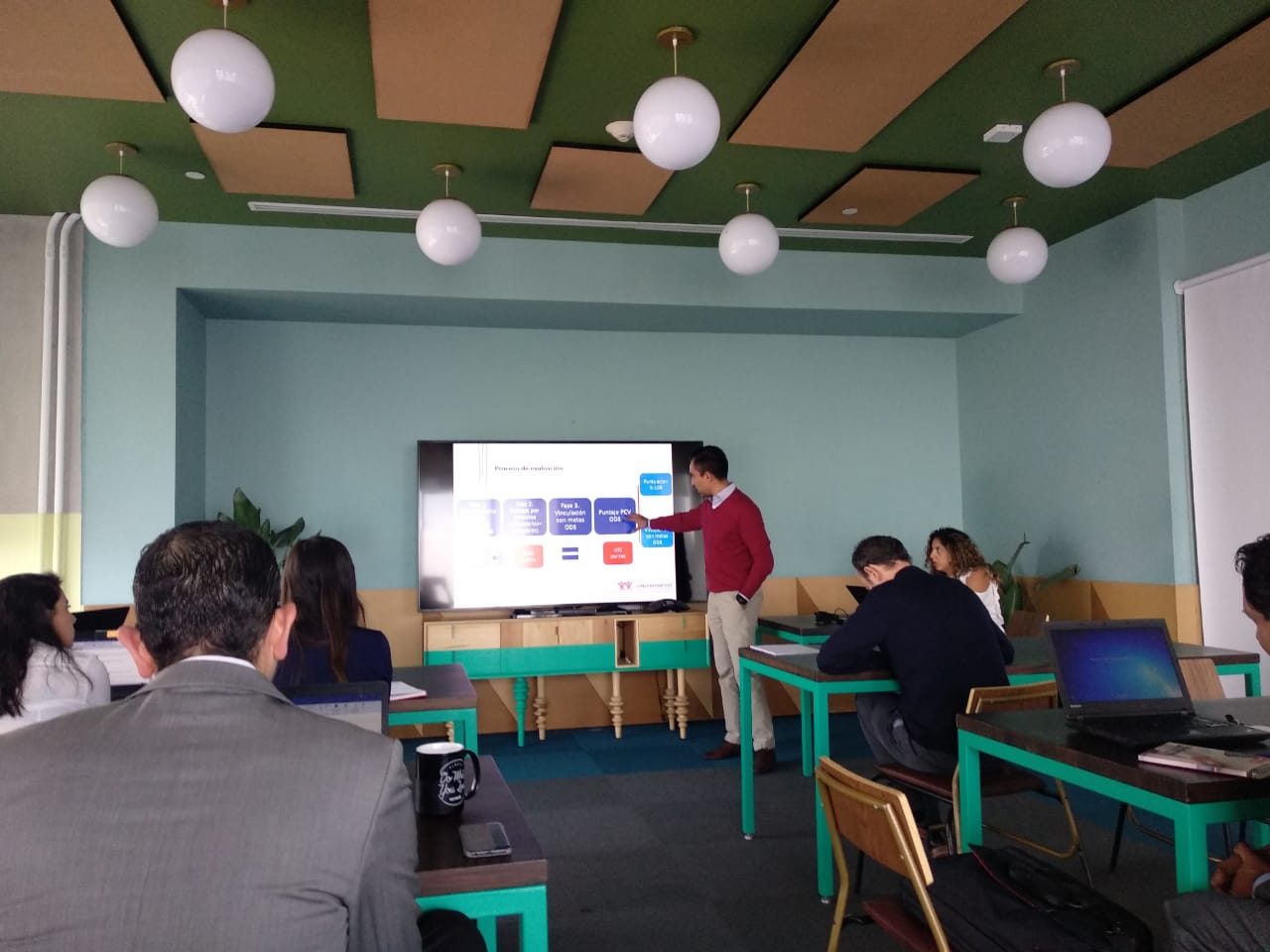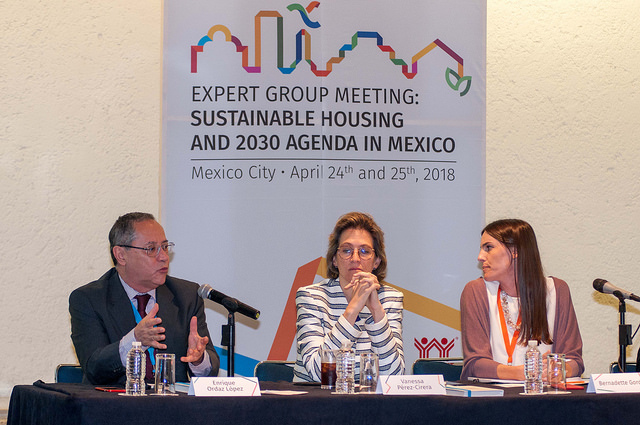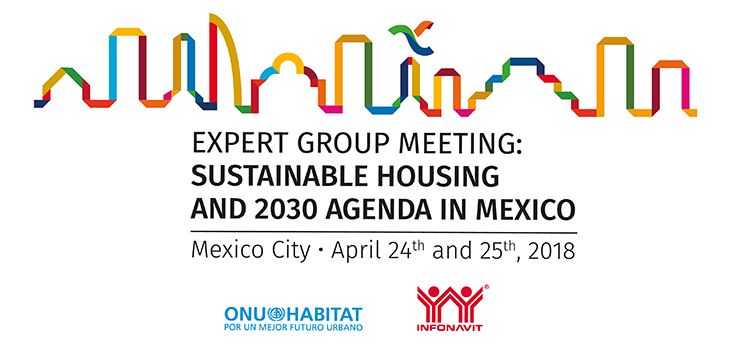Diagnosis and strategies for adequate housing in the framework of the project “Infonavit leading the implementation of the 2030 Agenda: housing at the center of SDGs”
Description
“Infonavit leading the implementation of the 2030 Agenda: Housing at the center of SDGs”, carried out between 2017 and 2018, aimed to position housing as a driver element for the fulfillment of SDGs and 2030 Agenda in Mexico. <br />
<br />
It was structured in three components: a) Generation of evidence b) Diagnosis and strategies for adequate housing c) Institutional framework based on the SDGs<br />
<br />
Second component intended to guide the actions of Infonavit and Mexican stakeholders towards a new paradigm that favors access to adequate housing for all in a sustainable development framework based on SDGs.
Infonavit, the largest social mortgage company in Latin America, has implemented together with UN-Habitat the project "Infonavit leading the implementation of 2030 Agenda: housing at the center of the SDGs " to position housing as a driver element to achieve the goals and objectives of the 2030 Agenda for Sustainable Development in Mexico. <br />
<br />
The main objective of the second component was to identify the potential contribution of housing sector to compliance with SDGs and the 2030 Agenda in Mexico. This analysis is founded on the Housing at the Centre approach, which aims to shift the focus from simply building houses to a holistic framework for housing development where people and human rights are at the forefront of sustainable urbanization. <br />
<br />
This component has two elements: the first, a “Housing certification program based on the SDGs”, a conceptual and technical evaluation scheme to promote an adequate housing supply with sustainability conditions in order to contribute to the fulfillment of 2030 Agenda for Sustainable Development. <br />
<br />
The certification program has a holistic and human rights-based approach which conceive housing as a central element for sustainable development. The program defines 91 specific attributes, grouped into 30 subcomponents and 9 components, that a sustainable housing should have consider. <br />
<br />
Each of these attributes are linked to a concrete and mensurable indicator to quantify its degree of compliance regarding to a reference threshold, previously defined and based on national and international references. In turn, these 91 indicators are conceptually linked to 17 SDGs and to two out of every three specific targets. Based on this linkage, it is possible to estimate numerically the contribution of each housing built to the fulfillment of the SDGs. In the future, this program could incorporate other elements of sustainability that increase the demand of the evaluation and allow that housing offer to achieve all sustainability criteria for 2030.<br />
<br />
The second element is “Housing and SDGs in Mexico” that develops an integral analysis about housing from an international perspective based on global agendas as New Urban Agenda and 2030 Agenda to overcome challenges still present in Mexico: persistence of high levels of inadequate housing, construction of housing units in disconnected and poorly consolidated peripheral areas, environmental imbalances generated by the construction of housing on not-developable land, as well as an inefficient management of human settlements to face natural and climatic hazards.<br />
<br />
Publication defined strategic orientations, proposals and specific lines of action - direct and indirectly related to all SDGs and its targets- for achieving a model of adequate housing for all, in order to leave no one nor any place behind and to lay the housing as an integrating element of urban planning, city construction and sustainable development. <br />
<br />
Both elements give the unique opportunity to develop a new housing paradigm in Mexico that allow release the potential that housing offers for country's development since an economic, social and environmental perspective based on the fulfillment of SDGs.
Additionally, “Housing certification program based on the SDGs” was developed in coordination with Housing Unit from UN-Habitat headquarters in Nairobi, while “Housing and SDGs in Mexico” received permanent counselling of four international experts in social, economic and environmental affairs and its peer review.
“Diagnosis and strategies for adequate housing” was structured in two groups of activities:
“Housing certification program based on the SDGs”
- Mapping and analysis. Investigation about national and international certification programs related to construction, energy efficiency, urban environment and quality of life of inhabitants in housing terms. Were reviewed built standards and codes in order to identify the feasibility to incorporate new criteria for sustainable housing.
- Conceptual and operational framework. Were identified concrete attributes conceptually related to SDGs framework and generate specific metrics to measure them with relatively simplicity in the Mexican context. Then, was developed a matrix to link these attributes and its indicators to each of 169 targets of SDGs.
- Pilot program. It was test the methodology in real conditions in order to obtain information about convenience to replicate this program in a massive way. Two specific housing developments were selected to apply the program and the results were integrated in a dossier.
- Implementation guide. It was developed a guide for housing developers and other stakeholders to standardize and scale the implementation of certification program. UN-Habitat office in Mexico provided training sessions for Infonavit´s Sustainable Development Research Center to integrate this program in its housing conditions evaluation processes.
- Positioning strategy and incentives definition. A communication and marketing strategy were created to position certification program among developers, public housing institutions and other stakeholders. A set of economic, financial, urban management and reputation incentives for developers and local authorities was defined to adopt this program as a good practice towards housing sustainability.
“Publication Housing and SDGs in Mexico”
- Conceptual definition. Based on the results of Experts Group Meeting (EGM) on Housing and the 2030 Agenda were identified the relation between housing sector and all objectives and targets of 2030 Agenda. It was a key element to give to the publication a comprehensive framework about sustainable development based on SDGs.
- Diagnosis and proposals. After an extensive contextualization process at the local level, were defined the main housing challenges and opportunities to contribute to the fulfillment of 2030 Agenda in Mexico. The advice of the Urban Housing Practitioners Hub (UHPH), through the implementation of a Housing Laboratory with virtual and face-to-face sessions, allowed to define significant proposals about inclusion of vulnerable groups in national housing policies.
- Technical sheets about SDGs. A core team in Mexico, integrated by professional researches in architecture, urban, environmental, economics and statistical affairs generated a set of worksheets to identify and describe the direct and indirect relations between housing and the SDGs and its targets.
- Draft development and per-review. Core team generated a complete draft of this investigation, interchanged and enriched with four international experts and with the Infonavit. Draft publication was submitted to an extensive review process to guarantee that proposals made hold a strong link with SDGs and were appropriate to the Mexican context, in order to promote its implementation.
- “Housing certification program based on SDGs”:
o Conceptual and operational framework based on 2030 Agenda
o Pilot program dossier
o Implementation guide
o Positioning strategy document
- “Housing and SDGs in Mexico”:
o Technical sheets about results of EGM and Housing Laboratory
o Technical sheets about conceptual relations between housing and SDGs and its targets.
o Integrated publication about housing and SDGs in Mexico
Main expected results
- “Housing certification program based on SDGs”:
This program will help to establish specific objectives and indicators for sustainable housing in Mexico, in compliance with 2030 Agenda. In the medium term will be useful to promote the construction of an adequate housing supply with sustainability characteristics; particularly, to strengthen Infonavit's capacity to continue as a reference for sustainable housing in Mexico.
In addition, given that incorporates shared indicators taken from international certification programs, will be possible to replicate the evaluation in countries or regions that wish to benefit from a high-quality certification linked to the SDGs. Extending the geographical scope of this certification will allow the generation of comparable information to evaluate, monitor and improve the supply of sustainable housing worldwide.
- “Housing and SDGs in Mexico”:
First result of this publication is the identification of the challenges in Mexico in terms of housing and sustainable development, through a renewal diagnosis from the Housing at the Center approach and SDGs framework.
A second result is the generation of six strategic orientations that UN-Habitat proposes to overcome them: promote intraurban social housing; facilitate the access of vulnerable groups to adequate housing; foster social rental housing; improve deficient urban fabrics; reduce the environmental impact of housing and increase its resilience and optimize the life cycle of housing. Each of these orientations has specific proposals and lines of action to implement them; in total, publication has 16 proposal and 49 lines of action appropriate to the legal, institutional and programmatic Mexican context, municipal, state and federal level.
The third main result is the conceptual identification of direct and indirect relationships between adequate housing and SDGs and its targets. Based on this linkage, it is also possible to identify the contribution of each proposal and lines of action to promote sustainable development, based on the improvement of housing conditions and within the framework of the 2030 Agenda.
Other partnerships with technical and specialised organisations as Urban Housing Practitioners Hub (UHPH) and other Mexican stakeholder related to housing sector were a key factor for project success. The advice and per-review of national and international experts in social, economic and environmental affairs, as well as the follow-up of Housing Unit from UN-Habitat headquarters enriched the technical scope of certification program and housing and SDGs publication.
Additionally, the methodology of this program was documented in detail, allowing its replication in other contexts to promote the construction of an adequate housing supply and to become an international reference tool for sustainable housing. Extending the geographical scope of this certification will allow the generation of comparable information to evaluate, monitor and improve the supply of sustainable housing worldwide.
In the case of “Housing and SDGs”, the methodology to identify direct and indirect relations between housing and the SDGs and its targets, as well as the strategic orientations, proposals and lines of action defined will allow that this publication will be a road map for policy makers in order to define housing policies from a sustainable development framework. In this sense, will be a source of information for implement local and national programs to promote adequate housing for all.
The Diagnosis and strategies for adequate housing component pretended to promote a new housing paradigm in which it is a central element of Mexico's national actions to comply with its global commitments on sustainable development, in a framework of alignment with the SDGs.<br />
<br />
The conceptual definition of the housing certification program and the publication on housing and SDGs in Mexico provides the basis for a framework of analysis on the challenges and opportunities of the sector to influence the improvement of the living conditions of population, based on the three dimensions of sustainable development: social inclusion, economic growth and environmental protection.<br />
<br />
With the collaboration between Infonavit and UN-Habitat it was possible to confirm that this housing paradigm based on the 2030 Agenda requires the participation of all the actors of society - individuals, civil organizations, academia and private initiative - in order to create a fertile environment for unleash the potential that housing offers for the development of the country. The permanent collaboration with national and international advisors guided the analysis framework of the publication and allowed generating specific proposals to enhance the relationship between housing and SDGs<br />
<br />
The conclusion of this project is clear: without positioning housing at the center of national development, Mexico will not achieve the objectives set by the 2030 Agenda.
https://www.youtube.com/watch?v=HZiN94gtil4
International experts in urban planning, economics and environment affairs participate in the Expert Group Meeting (EGM) about "Sustainable Housing and Agenda 2030 in Mexico" convened by UN-Habitat in the capital of the country
https://onuhabitat.org.mx/index.php/expertos-internacionales-dialogan-s…
SDGS & Targets
Deliverables & Timeline
Resources mobilized
Partnership Progress
| Name | Description |
|---|---|
| 14.1 | By 2025, prevent and significantly reduce marine pollution of all kinds, in particular from land-based activities, including marine debris and nutrient pollution |
| 14.2 | By 2020, sustainably manage and protect marine and coastal ecosystems to avoid significant adverse impacts, including by strengthening their resilience, and take action for their restoration in order to achieve healthy and productive oceans |
| 17.14 | Enhance policy coherence for sustainable development |
Feedback
Action Network


Timeline
Entity
Region
- Latin America and the Caribbean
Geographical coverage
Photos



Website/More information
Countries

Contact Information
DIEGO PEREZ FLOREAN, Analyst for the development of programs and projects
